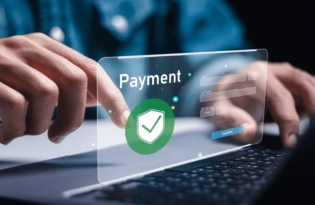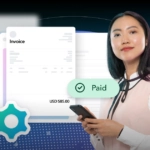US sales tax guide for international sellers
A few things have changed recently regarding US sales tax laws. As an international seller, we know you have questions. Need information on nexus? Registration? Exemptions? Read through our simple US sales tax guide for international sellers.

What is nexus?
When someone refers to nexus, they refer to a link or a connection with a state that stands as a prerequisite for any tax-related activities.
Only when one has nexus can a state require you to collect or pay its taxes. This could include sales or use tax collections, and income, franchise, or use tax payments.
Any activity helping to establish or maintain a market can create nexus, such as the existence of inventory, sales, and transactions. Third-party activities include installations, implementations, training, performance or services, sales, customer service, collection, and credit checking.
How do the new sales tax laws affect me?
International sellers should note that US states are becoming more aggressive in their search for tax evaders. The penalties and interests you can incur can exceed 50%.
This aggression has been partially spurred on by Amazon’s provision of seller information to US states, making it easier for these bodies to pursue foreign sellers.
Do I need to collect sales tax?
Before concluding whether or not to collect sales tax, you must take certain steps forward to further your understanding.
Firstly, make sure to analyze your nexus and your taxability. No nexus means no responsibilities!
Once you’ve done so, quantify your materiality (what is most important to you depending on your situation). Then, if you determine you do have nexus, register where you need to, then collect and remit your tax.
If so, when, where, and how should I register?
There are three ways that you could consider registering for sales tax collection.
Registering prospectively entails registering from the current date going forward, on all future sales.
Registering historically (how the state wants you to) entails registering from the date at which your nexus began.
And registering through a VDA (Voluntary Disclosure Agreement) grants you access to a reward for stepping forward and announcing yourself freely. Instead of the state looking back 7-10 years into your sales history, the state looks back 3-4 years and it waives certain penalties.
Frequently Asked Questions
Due to recent economic nexus changes, an international seller doesn’t require a physical presence to create nexus. Nexus can be generated by inventory or if your number of sales or transactions exceeds a certain amount per state.
Another change that has been made since the 1950s-1970s is that interstate commerce can now be taxed. Other states, apart from your own, now have the right to tax you for transactions across states and countries.
If you, as an international seller selling to US customers, have a physical presence or inventory in a warehouse in the US, you are required to collect sales tax.
Or, if your number of sales in the US exceeds a certain number (depending on the state to which you’re selling), you will need to collect sales tax.
However, if none of the above criteria apply to you, you are not required to collect sales tax as an international seller.
In order to register for sales tax as an international seller, you’ll need a Federal EIN (Employer Identification Number) and other business-related information.
As an international seller to US customers, it is necessary to register through your foreign entity within each US state you are operating in or have economic nexus. Visit each state’s Department of Revenue website for guidance on the appropriate registration process.
Compliance requirements for international sellers regarding US sales tax depend on myriad factors. These include your (the seller’s) location, the location of your customers, your product type, and the volume of your sales.
But the general rules are as follows.
As an international seller, you’re required to register for a US sales tax permit. Maintenance of your compliance requirements includes the remittance of sales tax on taxable transactions and the filing of regular sales tax returns.
Your sales tax returns need to be filed with the appropriate state and local tax authorities or government agencies. Regulations may differ according to state.
Read U.S. Sales Tax, Demystified for more information.
Common FBA exemptions include dietary supplements, clothing, and groceries. However, it is important to be knowledgeable about which state acknowledges which exemptions and exclusions (based on your particular product).
Tax jurisdictions change frequently, which can make it difficult to remain compliant. But, if you get your tax rates wrong, you could get audited. These rates apply to both products and customers, so keep up to date with any changes.
Other common mistakes include misdeclarations, missing payment dates, and both missing and invalid exemptions. Once again, keep a very detailed updated record of these to avoid auditing.
And don’t forget your consumer use tax. International sellers often focus primarily on their sales tax and forget their other tax requirements.
Related resources
Latest articles
-
A guide to starting a business in Estonia as a non-citizen
If you’ve thought about opening a new business somewhere with plenty of government support, expanding your business into the EU, or making it easier to work as a contractor or digital nomad anywhere in the European Economic Area (EEA), you should think about starting a business in Estonia…
-
How to simplify payment operations with Payoneer’s automation feature
Save time, reduce costs, and eliminate errors with Payoneer’s new payment automation feature.
-
How to prevent online payment fraud as an SMB
Prevent online payment fraud by overcoming challenges like phishing, fake accounts, and account takeovers (ATO) with enhanced security features from Payoneer.
-
Amazon Fees & Policy Updates 2024
Amazon regularly makes planned updates to fees and policies that may impact Payoneer customers that sell on Amazon. To keep Payoneer customers informed regarding upcoming and past updates, we’re providing a list of known changes to Amazon fees and Policy updates.
-
How Payoneer’s target exchange rate feature will help you save more on bank withdrawals
Boost savings with Payoneer’s target exchange rate feature.
-
Navigating phishing attacks: A guide to keeping your Payoneer account secure
Keeping your funds safe is our number one priority at Payoneer. While phishing attempts can happen, arming yourself with knowledge is key to keeping your data and money safe














